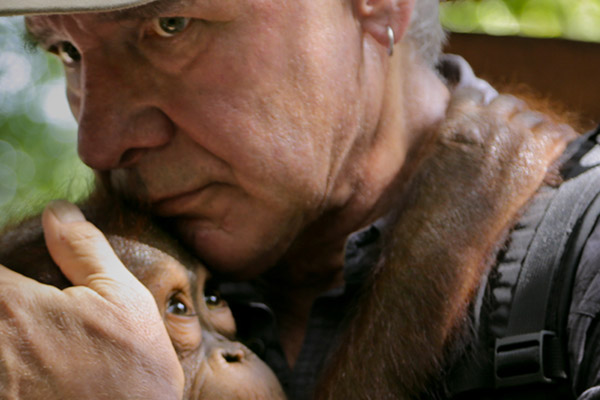
Harrison Ford with orangutan in Years of Living Dangerously. Photo from: Years of Living Dangerously/Showtime.
Although Showtime’s landmark new climate change series doesn’t premiere until Sunday, the network has released an edited version of the first episode of Years of Living Dangerously to the public (see below). The nine-part documentary series is being billed as a “groundbreaking” exploration into the many ways that climate change is already wreaking havoc on the lives of people around the world. Employing well-known celebrities—including actors, journalists, and politicians—to tell the stories, it is the first high-budget television documentary dealing solely with global warming.
The first episode begins a series of climate-related stories: Harrison Ford visits Indonesia to see first hand how deforestation and destruction of peat lands are contributing to the climate crisis; Don Cheadle heads to Texas to uncover if there’s a link between a biblical drought and climate change; and Thomas Friedman seeks to understand if climate change played a role in the civil war in Syria.
The series debuts on the heels of the most recent Intergovernmental Panel on Climate Change (IPCC) report on the impacts of climate change. The report, which is an aggregation of the last several decades of research by thousands of scientists, finds that global warming is already decreasing agricultural production, increasing water scarcity, acidifying the oceans, exacerbating extreme weather, and adding to the risk of civil conflict.

New palm oil plantation established on top of destroyed peat forest in Indonesia. Photo by: Rhett A. Butler.
Related articles

(03/31/2014) It’s not just melting glaciers and bizarrely-early Springs anymore; climate change is impacting every facet of human civilization from our ability to grow enough crops to our ability to get along with each other, according to a new 2,300-page report from the Intergovernmental Panel on Climate Change (IPCC). The massive report states definitively that climate change is already affecting human societies on every continent.
Deforestation makes Indonesia hotter, reduces quality of life

(03/26/2014) One of the reasons I like living in the tropics is that they are perpetually warm. A pair of shorts and a light shirt will comfortably get you through the day and night in most parts of Indonesia. Still there are the occasional unpleasant extremes. Even the most cold-blooded creature will likely break into a sweat walking for more than a few minutes in the sun filtering through Jakarta’s polluted skies. We consider such heat a normal part of the tropics. But is it really?
Extinction crisis: rising sea levels will submerge thousands of islands

(04/08/2014) Sea levels are rising at the highest rate in thousands of years, putting at risk low-lying islands around the world. In a new study published in Nature Conservation, researchers found that projected rises in sea level stand to swamp more than 10,000 islands, displacing human communities and wiping many unique species off the face of the earth.
From seals to starfish: polar bears radically shift diet as habitat melts

(04/07/2014) One of the most iconic species of the ongoing climate change drama, polar bears have dropped in numbers as their habitat melts, with previous estimates forecasting a further 30 percent reduction within three generations. However, their situation may not be as dire as it seems.
The incredible shrinking salamander: researchers find another casualty of climate change

(04/04/2014) Climate change is contributing to a slew of global problems, from rising seas to desertification. Now, researchers have added another repercussion: shrinking salamanders. Many amphibian populations around the world are currently experiencing precipitous declines, estimated to be at least 211 times normal extinction rates. Scientists believe these declines are due to a multitude of factors such as habitat loss, agricultural contamination, and the accidental introduction of a killer fungus, among others.
From theory to deadly reality: malaria moving upslope due to global warming

(03/06/2014) Malaria is a global scourge: despite centuries of efforts to combat the mosquito-borne disease, it still kills between 660,000 to 1.2 million people a year, according to World Health Organization data from 2010. Astoundingly, experts estimate that around 300 million people are infected with the disease every year or about 4 percent of the world’s total population. And these stats may only get worse. For years scientists have vigorously debated whether or not malaria will expand as global warming worsens, but a new study in Science lays down the first hard evidence.
Despite frigid cold in U.S., January was the fourth warmest on record worldwide
(02/27/2014) Worldwide, this January was the fourth warmest since record-keeping began, according to new data released by National Oceanic and Atmospheric Administration (NOAA). While parts of the world, most notably eastern North America and northern Russia, experienced temperatures well-below average, overall the month was a scorcher. In fact, another dataset, from NASA’s Goddard Institute for Space Studies (GISS), that uses different methodology, found that January was the third warmest since record keeping began.

(02/24/2014) An assessment of ocean acidification, presented at the UN Climate Change Conference in Warsaw in November 2013, starkly concluded that acidity is on track to rise 170 percent by the end of this century. As many key species are sensitive to changes in acidity, this would drastically impact ocean ecosystems, with effects especially pronounced in polar regions where the cold waters intensify acidification, and which are home to many organisms that are particularly vulnerable to acidification.